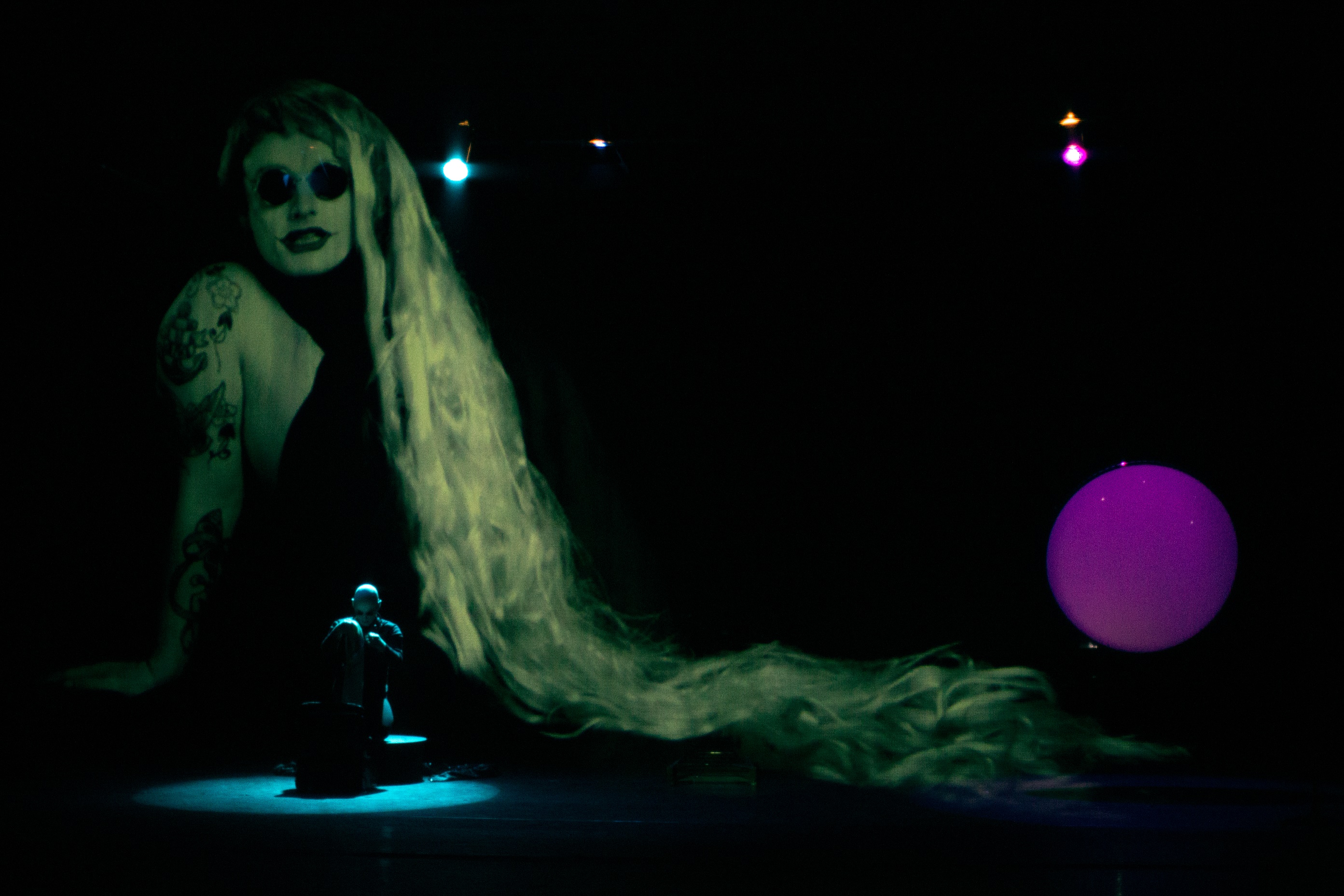We meet, and the angels sing…
LOST in TRANS gives us a plethora of interlocking love stories. Recordings. Traces. Echoes. Our host for the evening is Tiresias, the blind sage who lived part of his life as a man and part as a woman. This was back in the day – you know, Olympus and all that. Who feels the most desire, Zeus’s wife Hera asked. Who experiences the most pleasure in sex, man or woman? And here, the answer is laid bare.
Richard Boyce plays Dickie Beau who plays Tiresias as a hermaphrodite playing all other characters in the many stories we hear tonight. Well, almost all. There is also Eleanor Fogg playing johnsmith playing a pantomime horse playing Pegasus.
The key story around which all else turns is the myth, from Ovid’s Metamorphosis, of the nymph Echo who loved and pursued the beautiful youth Narcissus. But he was in love with his own reflection, and eventually died of unrequited love, wasting away until nothing was left of him but a little yellow flower – a narcissus. Echo too wasted away until nothing was left but her voice, doomed forever to repeat the last words of everything she hears.
One of the many marvellous things about this beautiful new show from Dickie Beau is its challenging portrayal of female sexuality, and investigation of what it means to be a woman. Echo is a gentle nymph, but she’s no retiring flower. She is upfront about her desire for Narcissus and pursues him with determination, throwing herself upon him in a rejected embrace.
Spring flowers feature in another extraordinary love story, captured on a 3-inch reel-to-reel tape found on a commuter train in the mid 1960s, and posted (under the name Nubbin) on a site that shares found audio material. An unnamed Canadian woman has recorded a love letter. The full 15 minutes is incorporated into the show. It starts with mundane commentary on the worsening weather in whatever city her lover lives in; on a friend or relative’s medical problems; and on the level of work she’s dealing with. Inundated, she says. She’d rather be at home, she says, snuggled in bed… the recording then moves into a highly charged declaration of sexual desire that is stunning in its honesty and detail. The recording steers back into the everyday, with a reflection that the crocuses and daffodils are coming out…
Another found recording also features a love letter, this time from a man to a woman – a married man, a clandestine relationship, so the man spins discs while he is making the recording so his wife doesn’t hear him. Dance band classics serenade us: And the Angels Sing. Smoke Gets in Your Eyes. His love is an obsessive, devouring love. But it is love, not sex, he insists.
And then there’s the drag queens, and the trans women, who add their voices. One voice talks about taking hormones, but holding back from going under the knife – you can always change your mind that way: be both sexes, like Tiresius, and move from one to the other and back again. One has made the transition, and is happy to be all woman. Another voice is clear that s/he might dress as a woman but is not a ‘real’ woman: ‘I’ve never had that service once a month.’
So those are the words – but there are pictures too! Oh such wonderful images that burst out of the darkness, morph into something else, dissolve. Toynbee Studio theatre’s traditional proscenium arch stage is perfect for the cinematic scenography of the piece. A thin black gauze veils the front of the stage. To the rear, stage left, a circular white screen – a moon, a mirror, a glowing sphere, sometimes projected on, sometimes shining white and empty – with a microphone on a stand placed in a spotlight in front of it; a podium stage-right which is the site for many of the live body’s moments of transformation.
Throughout most of the show, the dominant aesthetic is white and black, a play on the binary divide. The black-clad Tiresias, with a womanly bosom and a manly groin, has his/her trunk superimposed by a sexless white babygro suit that becomes a puppet-esque animated figure; and Narcissus appears as an enormous upside-down head in the ‘mirror’ that is the projected image on the gauze. A siren with floor-length hair sits and muses; a giant headless be-suited Perseus dangles a beheaded Medusa by her hair. Who’d be a hero? Joseph Campbell’s words resonate.
Dashes of colour: the subtle brown-and maroon shades of the centre of a spinning vinyl record projected on the thin black gauze as we hear our obsessive male adulterer say again and again ‘ I love you. I suppose you’re going to get tired of my saying it.’ The moon-like sphere a deep purple. Later, an intense reddish pink immerses the wildly wigged one-eyed Dickie who takes to the mic for a plaintive song: ‘ Only a dark cocoon before I get my gorgeous wings and fly away…’
The last time I saw Richard – Dickie – was in Blackouts at Sacred just a few weeks ago. LOST in TRANS uses many familiar motifs and tropes – the things that have become the tricks of his trade. The transformations. The play on gender. The investigation of identity. The interest in the play between artifice and reality. The lip-synching to recorded voice. The obsession with ‘found’ audio material: radio, reel-to-reel tape and vinyl. The use of the gauze screen and projections. The wigs. The multiplicity of overlapping voices. The slow, careful, movement work – living sculpture.
But LOST in TRANS feels light years ahead – a great leap into new territory in its complexity and richness of imagery and ideas. Richard’s got his gorgeous wings – and he’s flying high.
Featured imaage: Dickie Beau: LOST in TRANS at Toynbee Studios: Photo James Allan.

